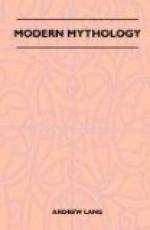MANNHARDT
Mannhardt’s Attitude
Professor Tiele, it may appear, really ‘fights for his own hand,’ and is not a thorough partisan of either side. The celebrated Mannhardt, too, doubtless the most original student of folk-lore since Grimm, might, at different periods of his career, have been reckoned an ally, now by philologists, now by ‘the new school.’ He may be said, in fact, to have combined what is best in the methods of both parties. Both are anxious to secure such support as his works can lend.
Moral Character Impeached
Mr. Max Muller avers that his moral character seems to be ‘aimed at’ by critics who say that he has no right to quote Mannhardt or Oldenberg as his supporters (1. xvi.). Now, without making absurd imputations, I do not reckon Mannhardt a thorough partisan of Mr. Max Muller. I could not put our theory so well as Mannhardt puts it. ’The study of the lower races is an invaluable instrument for the interpretation of the survivals from earlier stages, which we meet in the full civilisation of cultivated peoples, but which arose in the remotest fetishism and savagery.’
Like Mr. Max Muller, I do not care for the vague word ‘fetishism,’ otherwise Mannhardt’s remark exactly represents my own position, the anthropological position. {42a} Now, Mr. Max Muller does not like that position. That position he assails. It was Mannhardt’s, however, when he wrote the book quoted, and, so far, Mannhardt was not absolutely one of Mr. Max Muller’s ’supporters’—unless I am one. ’I have even been accused,’ says Mr. Max Muller, ’of intentionally ignoring or suppressing Mannhardt’s labours. How charitable!’ (1. xvii.) I trust, from our author’s use of the word todtschweigen, that this uncharitable charge was made in Germany.
Mannhardt
Mannhardt, for a time, says Mr. Max Muller, ’expressed his mistrust in some of the results of comparative mythology’ (1. xvii.). Indeed, I myself quote him to that very effect. {42b} Not only ’some of the results,’ but the philological method itself was distrusted by Mannhardt, as by Curtius. ’The failure of the method in its practical working lies in a lack of the historical sense,’ says Mannhardt. {42c} Mr. Max Muller may have, probably has, referred to these sayings of Mannhardt; or, if he has not, no author is obliged to mention everybody who disagrees with him. Mannhardt’s method was mainly that of folklore, not of philology. He examined peasant customs and rites as ‘survivals’ of the oldest paganism. Mr. Frazer applies Mannhardt’s rich lore to the explanation of Greek and other rites in The Golden Bough, that entrancing book. Such was Mannhardt’s position (as I shall prove at large) when he was writing his most famous works. But he ‘returned at last to his old colours’




